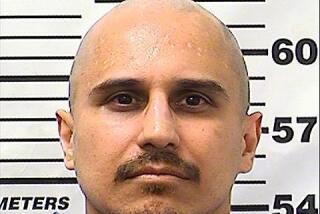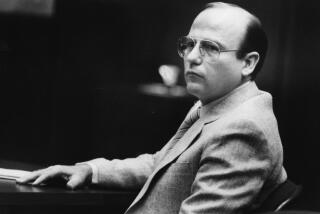Witness in B.I.G. Case Says His Memory’s Bad
On the eve of testifying about the murder of Notorious B.I.G., a prime witness for the rapper’s family has revealed that he suffers from severe memory lapses resulting from medication prescribed for a stress condition.
Kevin Hackie, an ex-FBI informant who was expected to provide eyewitness testimony tying corrupt police officers to alleged conspirators behind the 1997 slaying, spoke out Friday after learning that an arrest warrant had been issued to force him to testify in the family’s wrongful-death lawsuit against the city of Los Angeles.
The suit is set to go to trial Tuesday in Los Angeles federal court.
“I will be in court to testify, but it is a matter of record that I am stressed out and have been on medication for the past five years,” Hackie said during an extensive interview conducted in the presence of his attorney, Joseph L. Pittera of Torrance.
“My memory is bad. I’m going to answer questions to the best of my knowledge, what I remember. But this whole thing has put me over the edge. I am so stressed. I probably won’t even remember our conversation tomorrow.”
Notorious B.I.G., born Christopher Wallace, was gunned down March 9, 1997, after a music industry party outside the Peterson Automotive Museum in the Mid-Wilshire district. The case has spawned several investigations, and a cottage industry of books, documentaries and magazine articles exploring possible conspiracy theories involving Wallace and Tupac Shakur, the other leading rap artist of his generation, who was shot to death in Las Vegas the year before. No one has been charged in either slaying.
Early on, Los Angeles Police Department detectives speculated that the killings stemmed from a turf war between East Coast and West Coast rappers. Before their deaths, Shakur and Wallace had been feuding, and a rivalry between their record labels, Marion “Suge” Knight’s Los Angeles-based Death Row and New York-based Bad Boy Entertainment, had escalated into a series of assaults and shootings.
Wallace’s mother, Voletta, and other relatives sued the city three years ago, alleging that an ex-LAPD officer named David A. Mack conspired with Knight to kill her son. The suit says a college friend of Mack’s named Amir Muhammad, also known as Harry Billups, ambushed Wallace as his motorcade waited at a stoplight.
However, the FBI, citing lack of evidence, closed an investigation into this theory in January. On June 13, the family dropped Mack and Muhammad as defendants in the suit.
The next day, the rapper’s relatives persuaded U.S. District Judge Florence-Marie Cooper to issue the arrest warrant after Hackie failed to answer a subpoena to testify in the trial.
Hackie’s statements Friday cast further doubt on the theory at the center of the lawsuit: that corrupt police officers orchestrated the slaying of the 24-year-old rapper, and that top LAPD officials covered up their actions.
In a declaration filed June 6, 2004, Hackie, a former Death Row bodyguard, stated that he had “personal knowledge” regarding Wallace’s slaying, alleging that “persons within Death Row Records offered $25,000 to a law enforcement officer” to kill the rapper.
According to Hackie’s declaration, it was “well known within Death Row” that Mack and other LAPD officers worked as “covert agents” for the rap record label. Hackie stated in the document that he had personally observed Mack at the 1995 Black Image Awards, a 1996 boxing match in Las Vegas and “numerous Death Row functions” that were reserved for Knight’s close associates.
On Friday, Hackie said the Wallace family legal team had “altered” his statements before placing them in the declaration.
“My statements were taken out of context,” Hackie said. “Some things in there I never even said. They added them in. As far as David Mack attending private Death Row parties, I never said that. All I said was I saw him at some functions.”
Hackie said, however he takes “full blame” for signing a false declaration.
“I received about five or six different declarations to look over,” Hackie said. “I signed off on it one day when [one of the Wallace family lawyers] said it was imperative that it be signed. The fact is, I skimmed through the papers, but I didn’t really read it. I just signed it.”
Attorneys for the Wallace estate suggested that Hackie was afraid to testify.
“Mr. Hackie and his counsel have recently expressed extreme fear and reluctance to voluntarily participate,” said attorney Perry Sanders. “An earlier motion that we filed on his behalf to preserve his testimony because he was afraid was fought by the city, and the court denied it being taken. Now here we are on the eve of trial and it’s no wonder he attempts to distance himself from statements he made long before a lawsuit was ever filed.”
In his declaration, Hackie identified himself as a former “police officer” with the Inglewood Police Department and “Compton Unified District Police Department” between 1986 and 1996. Inglewood employed him as a police cadet, but fired him in 1987, Hackie said Sunday.
The Compton Police Department rejected his application, so he took a job with the Compton school police. He was fired in 1986 after an excessive-force complaint and received a stress settlement, Hackie said.
Before his dismissal, Hackie began working off duty as a bodyguard for Death Row Records, providing protection for rap star Shakur. During his tenure at Death Row, he became an informant for the FBI, which was investigating the rap label for alleged money laundering, drug trafficking and violent crimes, documents show. The probe, which has been closed, did not result in charges.
Hackie soon opened his own private security firm. He was arrested in 1999 and convicted for illegal weapons possession, although his conviction was later overturned.
While in jail, Hackie reached out to the LAPD and FBI, offering information about the Wallace slaying in the hope of obtaining a release from jail, law enforcement sources said.
In jail, Hackie first teamed up with then-LAPD Det. Russell Poole, the architect of the theory that Mack planned the killing at Knight’s behest and arranged for Muhammad to ambush Wallace.
Poole began focusing on Mack in late 1997 after the LAPD officer was arrested on suspicion of robbing a bank in Los Angeles. Poole began scrutinizing Muhammad after learning he had visited Mack in jail in December 1997.
Hackie is one of two alleged witnesses who tie Mack to Knight. Both Poole and Hackie assisted the FBI in its recently concluded 18-month probe into the slaying .
After Poole resigned from the LAPD, he began promoting his theory in books and through appearances in documentaries and on TV shows -- some of which also feature Hackie. Voletta Wallace’s lawsuit incorporates Poole’s arguments, and lawyers have said they intend to use him and Hackie as expert witnesses for the plaintiffs.
Hackie said he is beginning to question the motives behind the lawsuit -- and would prefer to back out before the trial starts.
“I want out of this. I think they’ve lost the focus of what this case was supposed to be about: catching B.I.G.’s killer,” he said. “Now, the entire focus appears to be on a settlement.”
In August, the city refused Voletta Wallace’s offer to settle the case for $105 million. The family later agreed to accept $18 million, but the City Council rejected the proposal in September.
Late Friday afternoon, the court granted a request by the Wallace family attorneys to quash the warrant for Hackie’s arrest. The action followed a lengthy meeting between Hackie and the attorneys.
Hackie said the Wallace family attorneys have asked him to share the stage at a news conference this afternoon with Wallace’s mother, the rapper’s ex-wife, recording artist Faith Evans, Poole and others connected to the case.
“I’m going to show up, but honestly, at this point, I think all that’s left to this case is a movie made for television, or maybe for big screen,” Hackie said. “I think at this point and time, that’s where it’s probably heading. I understand that Russell [Poole] has already been offered a movie deal. I haven’t been offered anything yet. No movie deal. No book deal. But if somebody wants to give me one, by all means, I’d do it -- if the price is right.”
More to Read
Sign up for Essential California
The most important California stories and recommendations in your inbox every morning.
You may occasionally receive promotional content from the Los Angeles Times.










